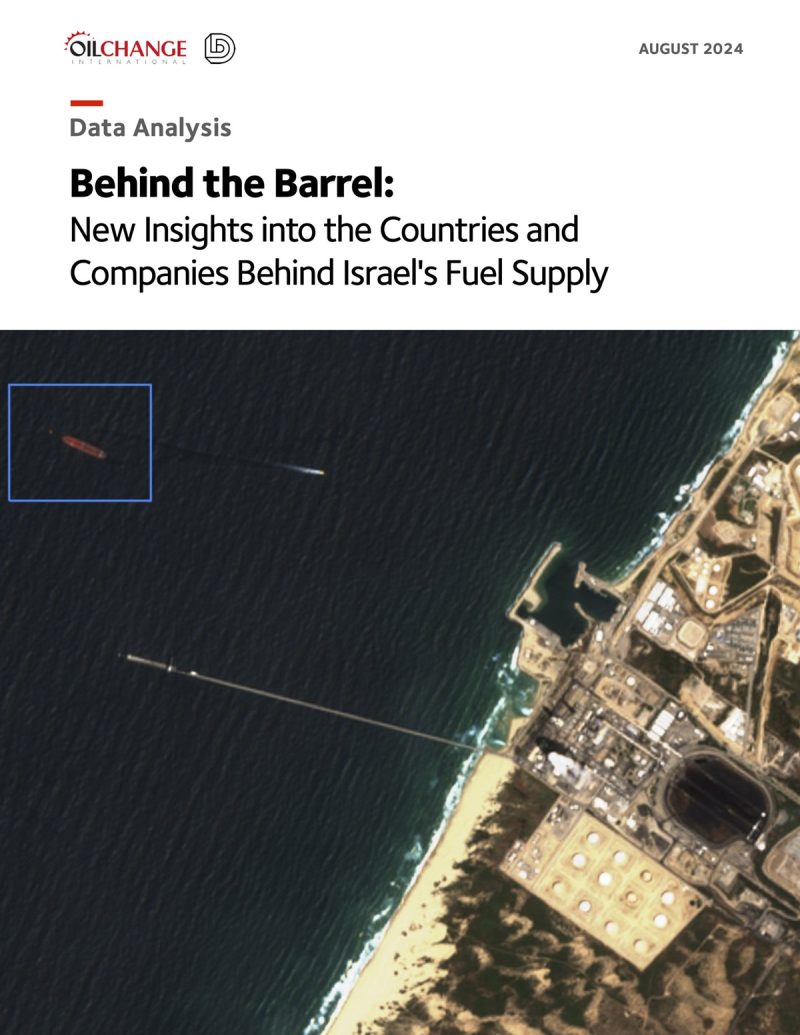
Behind the Barrel: New Insights into the Countries and Companies Behind Israel’s Fuel Supply
This updated analysis highlights the ongoing complicity of multiple countries and companies in fueling Israel’s war machine. As more and more Palestinians are killed in bombings and pressure intensifies on global leaders, including US presidential candidates, to end the genocide, these suppliers continue to enable the violence.
Behind the Barrel: New Insights into the Countries and Companies Behind Israel’s Fuel Supply
Updated findings from Data Desk, commissioned by Oil Change International, Behind the Barrel: New Insights into the Countries and Companies Behind Israel’s Fuel Supply, reveal continued and expanded oil supply fueling Israel’s ongoing genocide of the Palestinian people.Building on data released in March, countries and companies continue to fuel Israel’s war machine, despite the International Court of Justice’s (ICJ) opinion from January, stating Israel is plausibly committing genocide and Palestinians in Gaza have plausible rights under the Genocide Convention and from July, stating the occupation of Palestinian territory is unlawful.This updated analysis highlights the ongoing complicity of these countries and companies. As more and more Palestinians are killed in bombings and pressure intensifies on global leaders, including US presidential candidates, to end the genocide, these suppliers continue to enable the violence.
Download the data analysis Read the press release
Key Findings:
- Corporate Involvement: Investor-owned and private oil companies are complicit through their operations and ownership stakes in projects supplying oil to Israel. These companies collectively supply 66% of oil to Israel, and six major international oil companies (including Chevron (8%), BP (8%) ExxonMobil (6%), Shell (5%), Eni (4%), and TotalEnergies (5%) are responsible for over half of that (35%). According to some legal scholars, these companies could be held liable for complicity in acts of genocide, given the ICJ ruling.
- US Military Aid: The US continues to be a key supplier of JP8 Jet Fuel to Israel, crucial for its military operations. The shipments are coming from the Valero refinery in Corpus Christi, Texas. This supply chain is particularly controversial in the context of the US election, where continued military aid for Israel is under scrutiny. In early August, the US-registered Overseas Santorini, one of the key tankers involved in supplying US jet fuel, docked in Israel’s Ashkelon port, facing increased protest from communities and activists en route.
- ICJ ruling: 65 shipments of crude oil and refined petroleum products have been delivered to Israel from October 21, 2023 to July 12, 2024. 35 of these (54%) departed their origin port after the January 26, 2024 International Court of Justice (ICJ) ruling that Palestinians in Gaza have plausible rights under the Genocide convention.
- Azerbaijan: COP29 host Azerbaijan remains the leading supplier, providing 28% of the crude oil supply via the Baku-Tbilisi-Ceyhan (BTC) pipeline, majority owned and operated by BP. The Azeri oil is loaded onto tankers in the Turkish port of Ceyhan for export to Israel.
- European Connections: Italy, Albania and Greece have joined the list of supplying countries, sending shipments of crude and refined petroleum products. Cyprus and Greece are also implicated in providing transshipment services.
- Increased African Supplies: Gabon remains a major supplier of crude oil to Israel, with additional shipments now coming from Nigeria and Congo-Brazzaville.
- Brazil: Brazilian crude oil has made up 9% of the supply since the war started. Brazil also sent a tanker of fuel oil to Israel that arrived in April. As a significant oil supplier to Israel, Brazilian President Lula, who has been highly critical of Israel’s actions, has the opportunity to help bring about a ceasefire by pursuing an oil embargo.
